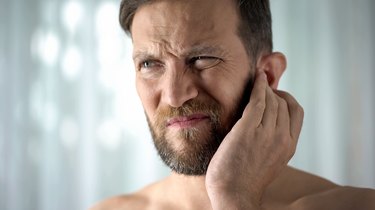
Is it possible that behind your ears actually…smells? Chalk it up to another one of those body oddities — or, actually, add it to the list of body parts that can give off an odor. (That's a long list, by the way.)
If you notice there's a stench back there, we've got you covered.
Video of the Day
Video of the Day
"It's not uncommon for patients to notice an unpleasant odor behind the ears. This is a region that tends to trap sweat and moisture, which can be a setup for unpleasant smells," S. Tyler Hollmig, MD, director of dermatologic surgery and director of laser and cosmetic dermatology at The University of Texas at Austin tells LIVESTRONG.com.
We asked Dr. Hollmig what could really be going on, and how to make things pleasant again:
1. Oily and Greasy Stuff Accumulates Back There
You know your T-zone can be an oil slick, but behind-the-ears can be, too.
The region "is relatively rich in sebaceous glands, which secrete oil and other greasy substances. The mixture may build up due to a lack of cleaning," Dr. Hollmig says.
Sebum has a — get ready for it — cheesy smell, he says. How much sebum you secrete is purely individual.
Fix it: Showering daily with a gentle soap (more on that in a minute) is sufficient.
2. It’s Normal Skin Bacteria
Along with excess oil, bacteria on your skin factor into the funky smell. Hair products and pollution can also collect there and contribute to the odor, Dr. Hollmig says.
Fix it: OK, it's showering (again). But even if you're not washing your hair daily, make sure you get your ears.
Related Reading
3. A Skin Condition Could Be the Culprit
Because the behind-the-ear area is rich in sebaceous glands, it's also prone to seborrheic dermatitis (SD), notes a December 2015 review in the Journal of Clinical and Investigative Dermatology.
Marked by itching, flaking and inflamed skin, as well as areas of crusting and oozing, SD usually shows up on the scalp, but it can also hit other sebum-saturated areas, like behind the ears, the upper chest and the face, researchers point out.
In infants, seborrheic dermatitis is known as cradle cap, but it affects up to 3 percent of the adult population, and it's thought a certain type of yeast may be a cause.
"This usually does not smell on its own, although it can yield greasy yellow flakes that may trap sweat and other materials, thereby causing a musty or other bad smell," Dr. Hollmig says.
Fix it: Especially if you have a smelly scalp as well, see your dermatologist, who may suggest prescription creams or shampoos or antifungals to clear up the crusts, per the Mayo Clinic.
4. Your Mask (or ‘Muffs) Is to Blame
When you wear something around your ears, like glasses, face masks, ear muffs or a helmet, the straps or frames trap sebum, pollution and bacteria, Dr. Hollmig says.
"When these have no place to escape, build-up can cause acne, an unpleasant smell and various other skin conditions, like dermatitis," he explains.
Fix it: Along with sudsing up the ear area, wash the items that hug your ears regularly. Toss earmuffs and headbands into the washing machine, and always wash your mask after each use.
5. Your Ear Piercings Are Causing Trouble
If, along with a smell, you're also noticing pain, swelling and drainage, and you just received a new piercing, well, it might be an infection.
"Infections may arise if a piercing was not performed in a sterile environment, where bacteria or other organisms were embedded into the skin," Dr. Hollmig says.
Other piercing-associated skin woes include irritation and allergy.
Fix it: See your doctor or dermatologist. Treatment for an infection includes antibiotics — and you may have to have the piercing removed, he says.
The Best Way to Clean Behind Your Ears
Make a special effort to wash here. It's easy to assume that the suds from your shampoo will do the job, but "there's a reason our mothers always reminded us to scrub behind our ears," Dr. Hollmig says.
Every day is best, because consistency is key, Dr. Hollmig says. The same gentle cleanser you use for your face can also be used to suds up your ear area, as it's strong enough to remove the dead skin, dirt, sebum, wax and bacteria.
"I would not recommend that patients use overly harsh scrubs, as the ears are also prone to irritation and eczema," he adds.
Was this article helpful?
150 Characters Max
0/150
Thank you for sharing!
Thank you for your feedback!
Is this an emergency? If you are experiencing serious medical symptoms, please see the National Library of Medicine’s list of signs you need emergency medical attention or call 911.